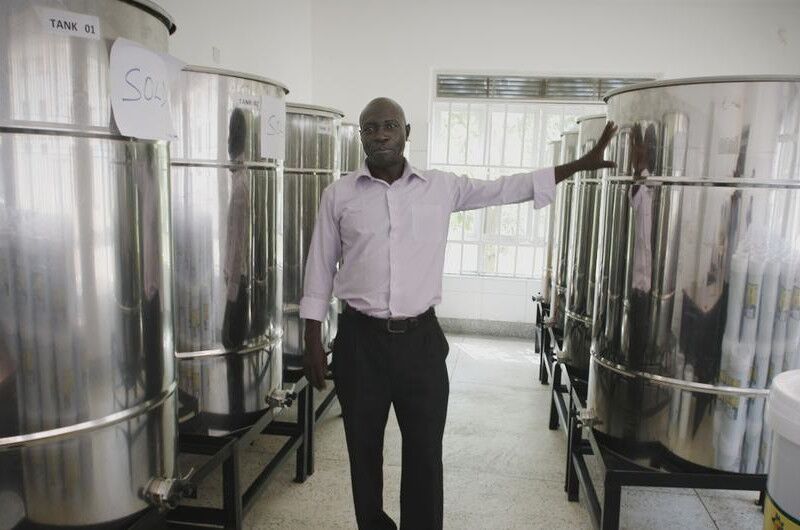
Sam Aderobu, founder of Honey Pride. Photo by: UN News/ Hisae Kawamori
Sam Aderubo, founder of Honey Pride – situated in Arua, northern Uganda – outlines his business journey.
I used to work in an office, and people would come to my place of work to sell ‘West Nile honey’, named after the region I come from. I was interested to see that my region was being used as a brand, and discovered that West Nile is one of the top ranked regions in Uganda for the production of honey.
So, I decided that I would come back home, and start a company to serve my community.
The product is in demand, both locally and internationally, and has positive medicinal and food properties. We realised that there is strong potential to produce it on a large scale.
However, many people in this region are only collecting honey in a traditional way, as a hobby. We decided to give farmers guidance, and provide them with the necessary skills because before, they were working without any formal support; no-one was willing to invest in supporting them to improve the quality of their honey.
Today, we’re working with over 1,700 farmers, who harvest honey from apiaries on their land. We provide a reliable market for them, which encourages them to produce more.
We believe that if beekeeping is taken to a level where farmers understand it as a as a business, it’s going to improve their livelihoods. When we started the business in 2015, a kilo of honey sold for around 3,500 Ugandan shillings. Today it’s about 7,000 shillings. This has motivated many farmers to go into beekeeping.
Now they can afford basic necessities, and they don’t have to worry about going hungry. They can buy goats and other animals, and pay their children’s school fees. Some have even been able to acquire property. Beekeeping is changing their lives.
Our vision was to be a market leader in the sale of sustainable beehive products in the Great Lakes region, and to sell globally. Our products are now meeting international standards, and are being accepted in foreign markets.
We’re trying to build up a dedicated management team, and many of them are young people. We’re getting help from a programme run by the Food and Agriculture Organisation (FAO), which is addressing the attitude of youth towards agriculture, and how they can be motivated to embrace agriculture as a source of employment.
The young people we are interacting with, are beginning to realise that they have a big part to play in national development. So, while we want to make a profit, we also have a social aspect to what we do.
Finance has been one of our biggest challenges. Because of a lack of finance, much of the honey-making process have been done manually. However, the UN Capital Development Fund (UNCDF), has enabled us to get funding from the Uganda Development Bank, and improve part of our production process.
We are now using an electric honey press, and were able to acquire a filtering machine to improve the quality of our product. We are able to process about five tonnes of honey in a month, which is a very big jump in capacity, and I’m sure that we will be able to grow that to about 15 tonnes.
This article was originally published by Africa Renewal.


